Faith isn’t just about beliefs; it’s a journey that beckons us to explore, question, and delve deeper into the profound mysteries that underpin our Catholic heritage. In this ever-evolving world, where inquiries and scepticism often challenge the fabric of our beliefs, there exists an undeniable yearning within every Catholic soul to understand, defend, and cherish the tenets of their faith.
These questions, rooted in the essence of Catholicism, serve as guiding stars on our pilgrimage toward spiritual enlightenment. They aren’t just queries that demand rote answers; they represent gateways to profound truths, intricately woven into the tapestry of Scripture, tradition, and the richness of our Church’s history.
As Catholics, the call isn’t solely to possess blind faith, but to engage in an informed and vibrant faith — one that not only withstands scrutiny but also stands as a beacon of hope and understanding for both believers and seekers alike.
In this exploration, we’ll embark on a transformative journey through ten pivotal questions, each serving as a cornerstone of Catholic belief. These queries aren’t confined to theological discourse but resonate with the heartbeat of our faith, challenging us to delve into sacred texts, ancient traditions, and the spiritual wisdom passed down through generations.
Whether you’re a lifelong Catholic seeking to deepen your understanding or someone curious about the foundations of this faith, this exploration aims to shed light on these critical inquiries. Our intent is not merely to provide answers but to unravel the depths of these fundamental questions, empowering every Catholic to articulate, comprehend, and embrace the beauty and richness of their faith.
Here are the ten most asked questions and the answers that should help you satisfy both your questioner and yourself.
10 Are your beliefs found in the Bible?

Every Catholic belief can find its roots in the Bible, either explicitly or through indirect references. The clarity of Scripture isn’t always absolute on every doctrine, and this aligns with the teachings found within the Bible itself.
Scripture not only points to an authoritative Church and Tradition but also emphasizes the importance of holding onto the teachings passed down through word of mouth or letter, as St. Paul stated in his Second Letter to the Thessalonians (2 Thess 2:15).
The early Christians, faced with significant disagreements, didn’t solely resort to the Bible, which wasn’t compiled yet; instead, they convened councils that established binding decrees (Acts 15:1-29). The formation of the Bible itself was guided by the Church in the late fourth century. Hence, Sacred Tradition and authority were indispensable for the existence of the Bible we have today.
9. Why do you obey the Pope?
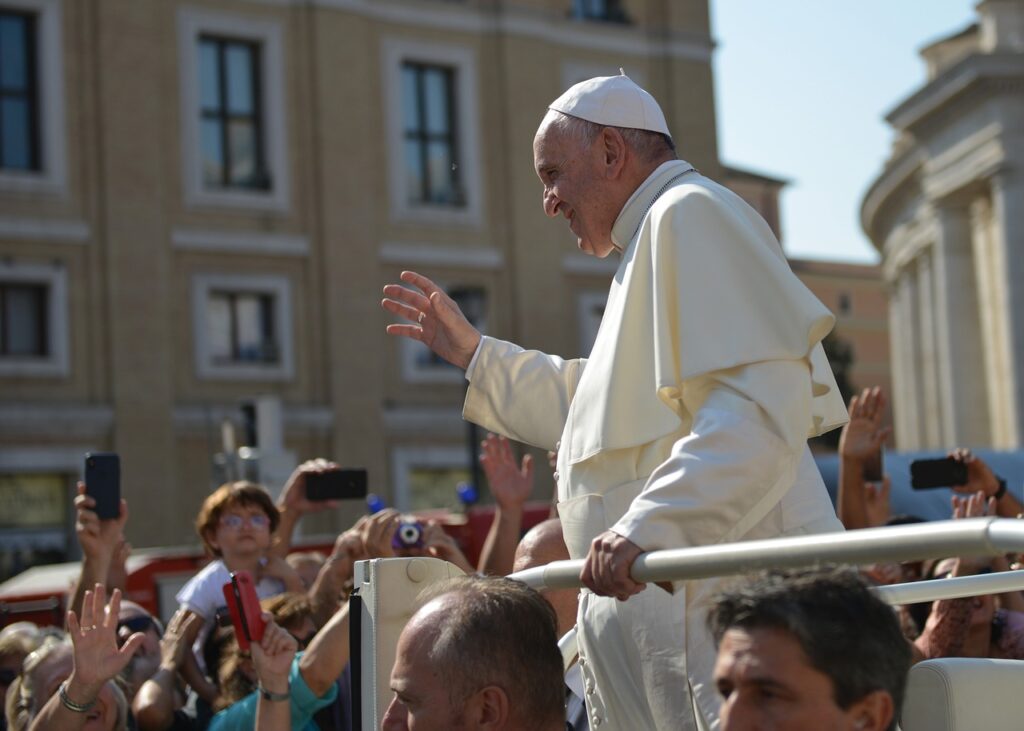
Catholics believe in Jesus’ commissioning of St. Peter as the first leader of the Church. The Gospel of Matthew provides a direct biblical reference to the papacy (Mt 16:18-19), clearly portraying Peter as the leader among the disciples.
While a pope can make infallible pronouncements under specific conditions, this doesn’t imply absolute impeccability in all their declarations. Similarly, just as Christians believe God protected the Holy Scripture from error, Catholics trust in the guidance of the Holy Spirit to safeguard His Church and its leader from error, despite the involvement of fallible individuals (Jn 14:16).
8. Why do you call your priest “Father”?
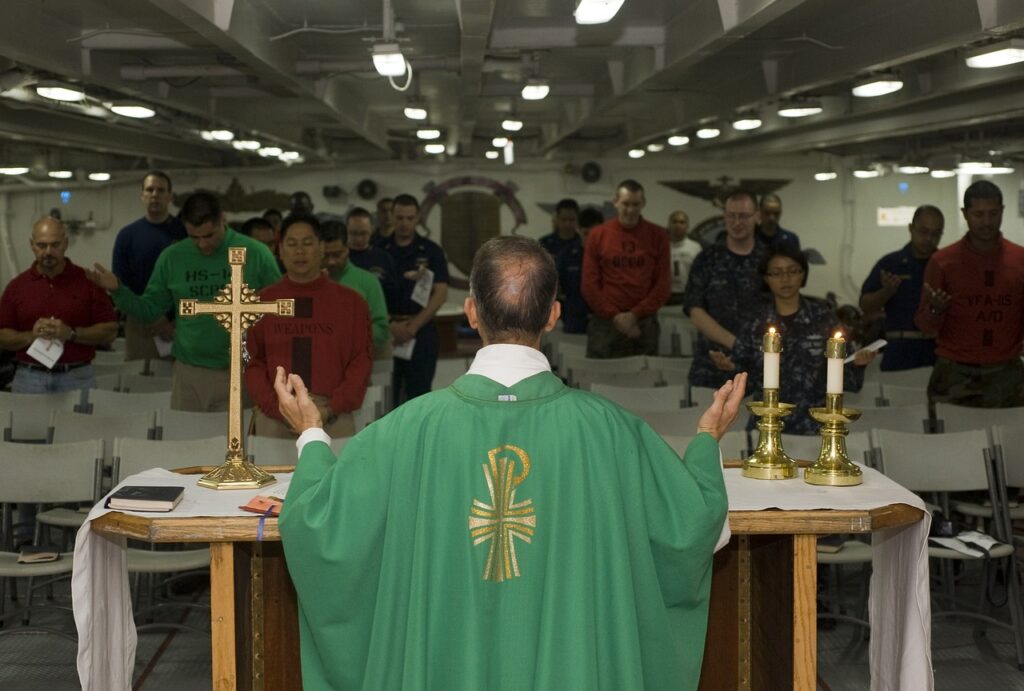
“And call no man your father on earth, for you have one Father, who is in heaven” (Mt 23:9). In this passage, Jesus is teaching that God the Father alone is ultimately the source of all authority. But He is not speaking absolutely, because if so, that would eliminate even biological fathers, the title “Church Fathers”, the founding fathers of a country or organization and so on.
Jesus himself uses the term “father” in Matthew (15:4-5; 19:5, 19, 29; 21:31), John (8:56) and several other places. In the parable of the Rich Man and Lazarus, Jesus presents Lazarus as using the address “Father Abraham” twice (Lk 16:24, 30 – see also Acts 7:2; Rom 4:12; Jas 2:21). St. Paul also uses the term when he writes, “I became your father in Christ Jesus through the gospel (1 Cor 4:15 – see also 1 Cor 4:14-16) and refers to “our forefather Isaac” (Rom 9:10)
The term serves as a recognition of authority and lineage rather than undermining God’s authority.
7. Why do you pray for the dead?
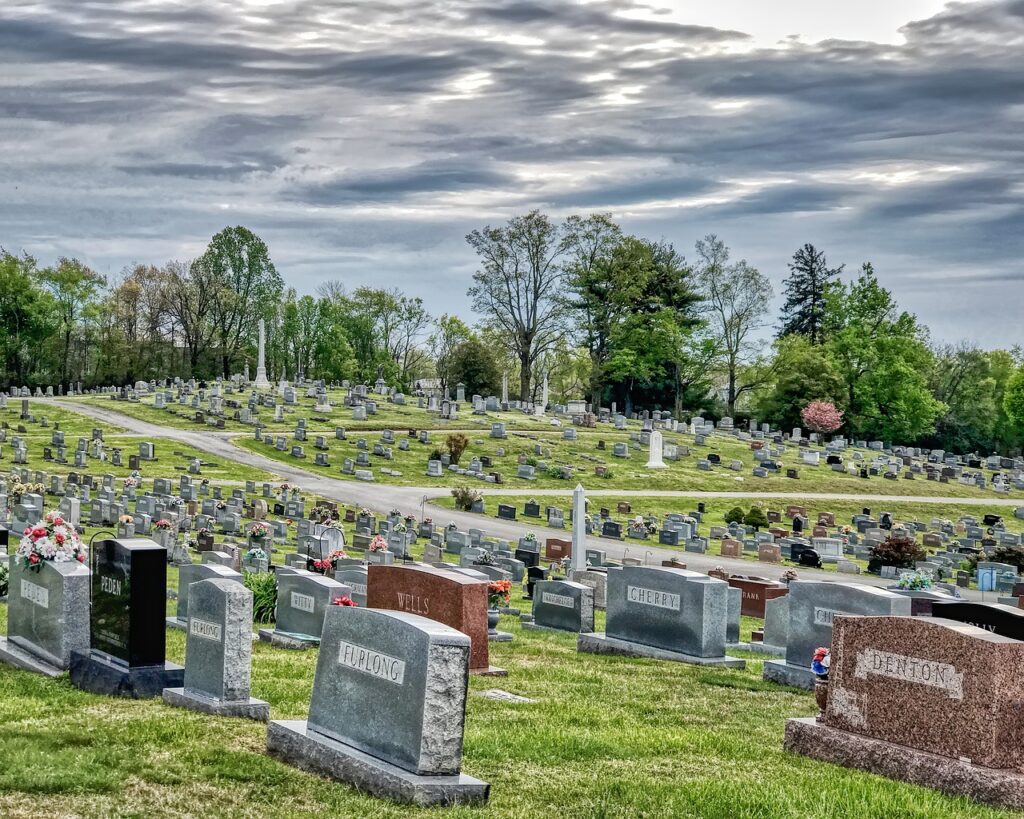
The Bible teaches the rightness of prayers for the dead in 2 Maccabees (12:40, 42, 44-45): “Then under the tunic of every one of the dead they found sacred tokens of the idols of Jamnia, which the law forbids Jews to wear. And it became clear to all that this was why these men had fallen … And they turned to prayer, beseeching that the sin which had been committed might be wholly blotted out … For if he were not expecting that those who had fallen would rise againn, it would have been superfluous and foolish to pray for the dead …He made atonement for the dead, that they might be delivered from their sin.”
St. Paul teaches this in a similar way: “Otherwise, what do people mean by being baptized on behalf of the dead? If the dead are not raised at all, why are people baptized on their behalf?” (1 Cor 15:29). This indicates prayer and fasting for the dead.
The word baptism often symbolically refers to penances (Mk 10:38-39; Lk 3:16, 12:50). The apostle Paul also appears to be praying for a dead person, Onesiphorus, in 2 Timothy (1:16-18).
6. Why do you pray to idols (statues)?
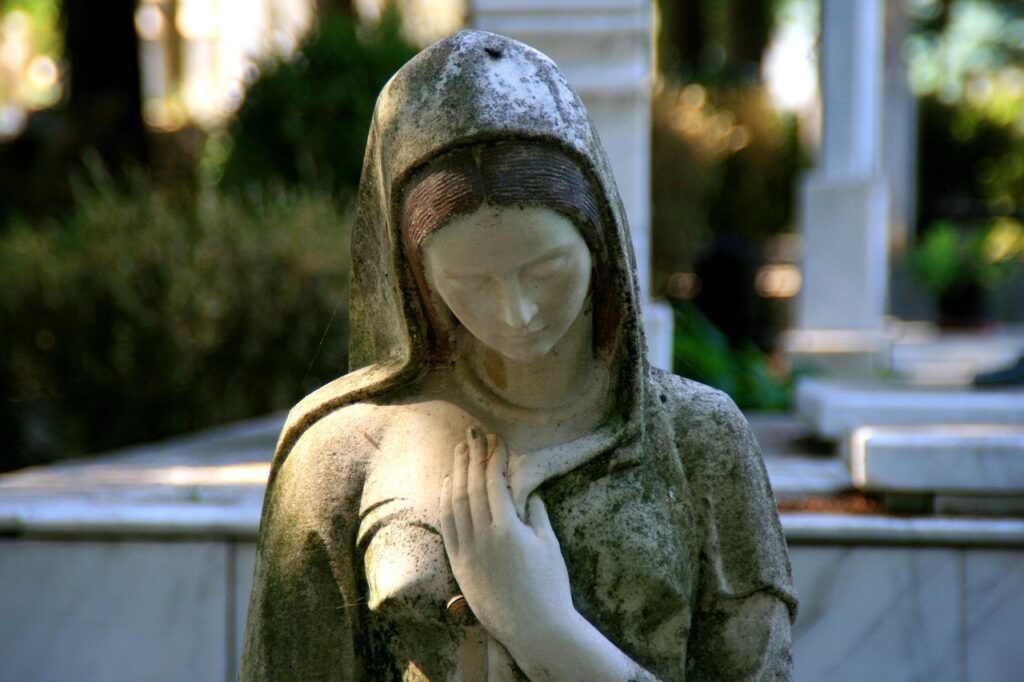
No Catholic who knows anything about the Catholic faith has ever worshipped a statue (as in pagan idolatry). If we cherish the memory of mere political heroes with statues and that of war heroes with monuments, then there can be no objection to honouring saints and righteous men and women: “Honor all men. Love the brotherhood. Fear God. Honor the emperor” (1 Pet 2:17 – see also Rom 12:10; Heb 12:22-23).
Statues are simply a visual reminder of great saints and heroes of the faith (Heb 11), who are more alive than we are (2 Cor 3:18), as is evident by their praying: “O Sovereign Lord … how long before thou wilt judge and avenge our blood on those who dwell upon the earth?” (Rev 6:10 – see also Ps 35:17).
The saints in heaven were never intended by God to be cut off from the Body of Christ on earth. They are involved in intercession, just as the saints on earth are and they are described as “so great a cloud of witnesses” (Heb 12:1).
5. Why do you confess your sins to a priest?
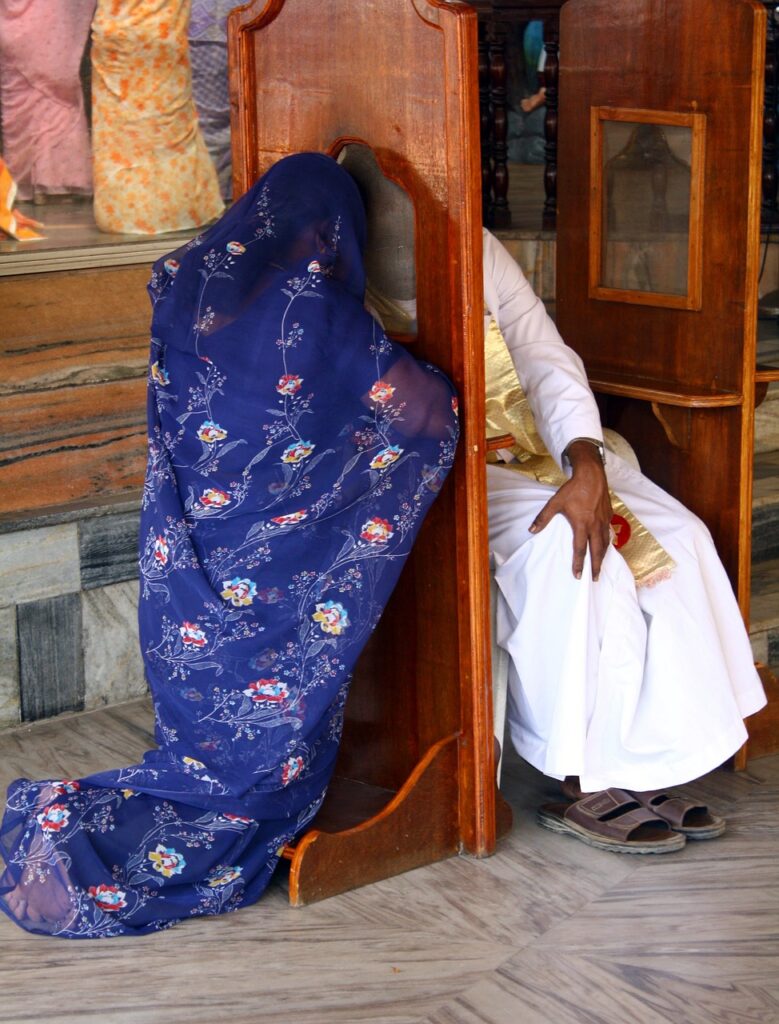
Jesus Christ gave His disciples – and by extension, priests – the power not only to “loose” sins (that is, forgive in God’s name), but also to “bind” (that is, impose penances): “Whatever you bind on earth shall be bound in heaven and whatever you loose on earth shall be loosed in heaven” (Mt 18:18 – see also Mt 16:19). “If you forgive the sins of any, they are forgiven; if you retain the sins of any, they are retained” (Jn 20:23).
The priest serves as the representative of God and of His mercy.
Confession gives new courage, confidence and a fresh start. One learns humility through this practice, receives additional grace to avoid sin and attains a certainty of forgiveness that is superior to mere feelings. Confession is also indicated in Matthew (3:5-6), Acts (19:18) and 1 John (1:9).
4. Why do you worship Mary?
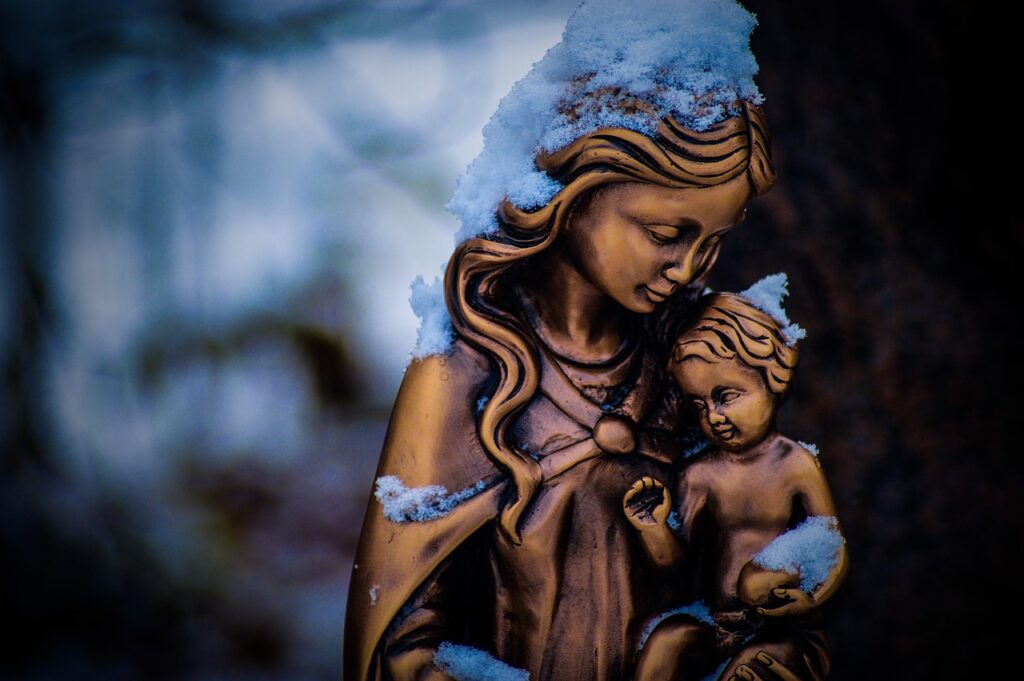
Catholics do not worship Mary. We venerate her because she is the mother of God the Son, our Lord Jesus Christ. Veneration is completely different from the adoration of God. It is the honouring of a person, not the worship of Almighty God, our Creator.
Catholics believe that Mary is the highest of God’s creatures because of her exalted role. But of course, like any other human being, she had to be saved by the mercy of God. She said, “My spirit rejoices in God my Savior” (Lk 1:47). We believe that God saved her by taking away all stains of original sin at the moment of her conception (the Immaculate Conception).
The very fact that God took on flesh and became man (Jn 1:1, 14) indicates that he wished to involve human beings in His plan of salvation for mankind. Mary was a key person for this purpose, so this is why Catholics honour her so highly.
3. Why do you worship wafers?
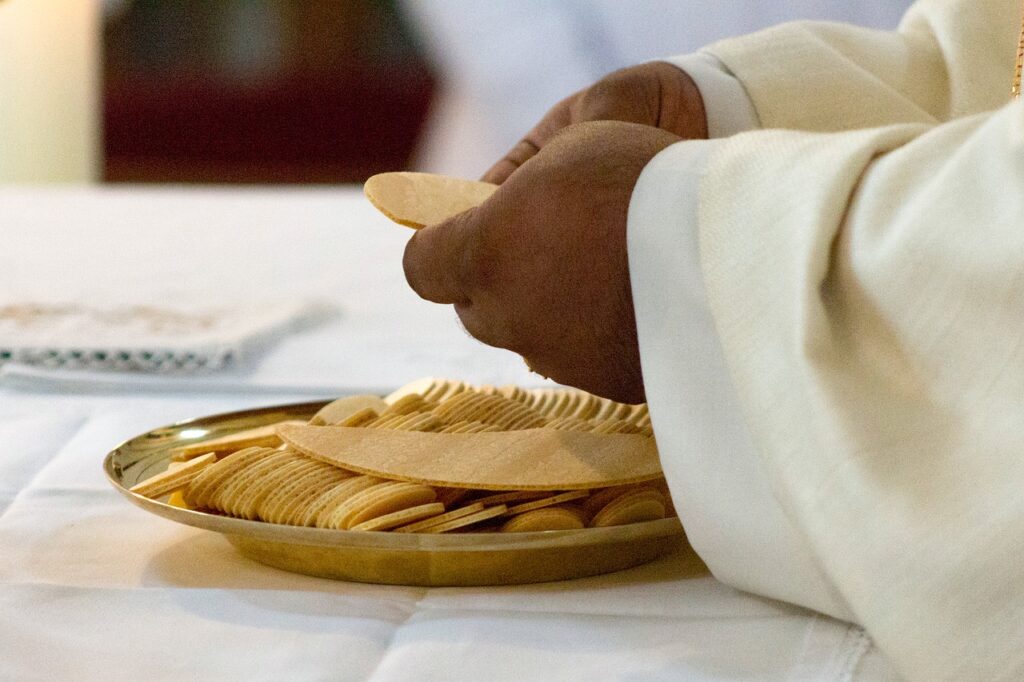
A consecrated host or wafer at a Catholic Mass is the true Body and Blood of Christ, not merely bread; so Catholics are worshipping Jesus, not a wafer. In the Gospel of John (6:51-56), Jesus states repeatedly that “he who eats my flesh and drinks my blood has eternal life” (6:54).
He is speaking literally and He is so firm that many followers object and leave Him (6:52, 60, 66). St. Paul agrees with this interpretation and writes that those taking Communion “in an unworthy manner will be guilty of profaning the body and blood of the Lord” (1 Cor 11:27 – see also 1 Cor 10:16). We don’t sin against someone’s “body and blood” by destroying a photograph (which is a mere symbol) of the person.
Moreover, in the Last Supper passages (Mt 26:26-28; Mk 14:22-24; Lk 22:19-20), nothing suggests a metaphorical or symbolic interpretation. The Last Supper was the Jewish feast of Passover. This involved a sacrificial lamb and Jesus referred to His imminent suffering (Lk 22:15-16, 18, 21-22). John the Baptist had already called Him the “Lamb of God” (Jn 1:29).
2. If you died tonight, would you go to heaven?

Catholics have an assurance of salvation if they are faithful and keep God’s commandments (1 Jn 2:3). If they die in that state, they are assured of heaven. But to enter heaven, one must be perfectly holy, because “nothing unclean shall enter it” (Rev 21:27 – see also Is 4:4; Mal 3:2-4).
The cleansing and purifying of any remaining sin, which makes us fit for God’s holy presence, is what Catholics call purgatory. This is indicated in St. Paul’s writings: “Each man’s work will become manifest; for the Day will disclose it, because it will be revealed with fire and the fire will test what sort of work each one has done … If any man’s work is burned up, he will suffer loss, though he will be saved, but only as through fire” (1 Cor 3:13, 15). “For we must all appear before the judgment seat of Christ, so that each one may receive good or evil, according to what he has done in the body” (2 Cor 5:10).
1. Are you saved?
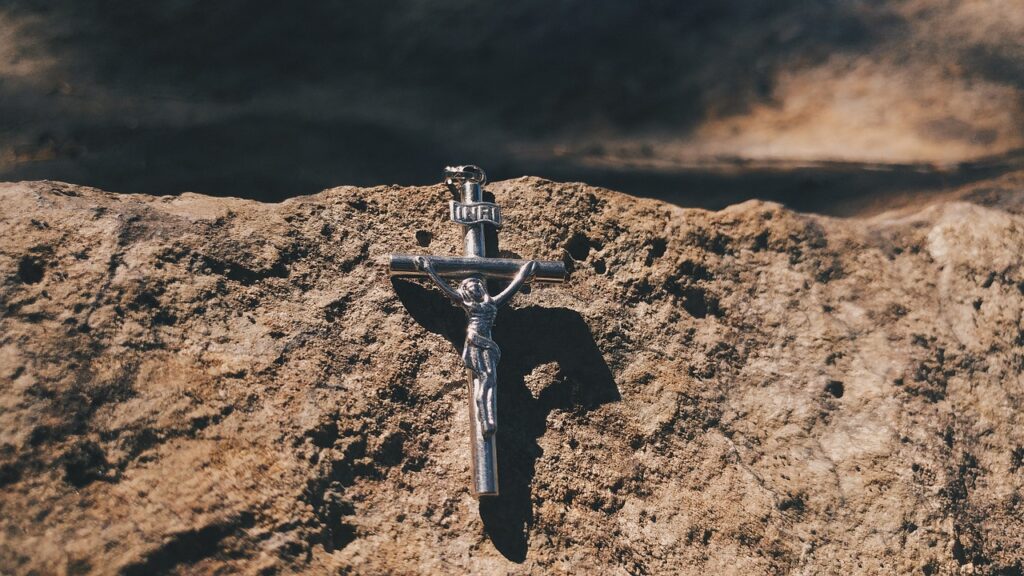
Catholics can be sure as anyone else that they are in God’s good graces. The apostle John states that “you may know that you have eternal life” (1 Jn 5:13 – see also Jn 5:24). But this “assurance” has to be understood in light of John’s other teachings in the same book: “For this is the love of God, that we keep his commandments” (1 Jn 5:3 – see also 1 Jn 2:3-6). “We know that any one born of God does not sin” (1 Jn 5:18). “He who loves God should love his brother also” (1 Jn 4:21). “He who commits sin is of the devil” (1 Jn 5:18 – see also 1 Cor 6:9).
Likewise, St. Paul does not regard salvation as a one-time event, but as a goal to be sought after, one that can be lost: “Work out your own salvation with fear and trembling” (Phil 2:12 – see also 1 Cor 9:27, 10:12; Gal 5:1, 4; Phil 3:11-14; 1 Tim 4:1, 5:15).
Source: ccatuga.org





